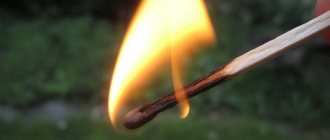ST 260 of the Criminal Code of the Russian Federation.
1. Illegal felling, as well as damage to the point of stopping the growth of forest plantations or trees, shrubs, and vines not classified as forest plantations, if these acts were committed on a significant scale, -
shall be punishable by a fine in the amount of up to five hundred thousand rubles, or in the amount of the wages or other income of the convicted person for a period of up to three years, or by compulsory labor for a term of up to four hundred eighty hours, or by corrective labor for a term of up to two years, or by forced labor for a term of up to two years. with a fine in the amount of one hundred thousand to two hundred thousand rubles or in the amount of wages or other income of the convicted person for a period of one year to eighteen months or without it, or imprisonment for a term of up to two years with a fine in the amount of one hundred thousand to two hundred thousand rubles or in the amount of wages or other income of the convicted person for a period from one year to eighteen months or without it.
2. Illegal logging, as well as damage to the point of stopping the growth of forest plantations or trees, shrubs, and vines not classified as forest plantations, if these acts are committed:
a) a group of persons;
b) has become invalid;
c) by a person using his official position;
d) on a large scale, -
shall be punishable by a fine in the amount of five hundred thousand to one million five hundred thousand rubles, or in the amount of the wages or other income of the convicted person for a period of three to four years, or by forced labor for a term of up to four years with a fine in the amount of one hundred fifty thousand to three hundred thousand rubles. or in the amount of wages or other income of the convicted person for a period of eighteen months to two years or without it and with or without deprivation of the right to hold certain positions or engage in certain activities for a term of up to three years, or with imprisonment for a term of up to four years with a fine in the amount of one hundred fifty thousand to three hundred thousand rubles or in the amount of wages or other income of the convicted person for a period of eighteen months to two years or without it and with or without deprivation of the right to hold certain positions or engage in certain activities for a period of up to three years.
3. Acts provided for in parts one or two of this article, committed on an especially large scale, by a group of persons by prior conspiracy or by an organized group, -
shall be punishable by a fine in the amount of one million to three million rubles, or in the amount of the wages or other income of the convicted person for a period of four to five years, or by forced labor for a term of up to five years with a fine in the amount of three hundred thousand to five hundred thousand rubles, or in the amount of wages or other income of the convicted person for a period of two to three years or without it and with deprivation of the right to hold certain positions or engage in certain activities for a term of up to three years or without it, or imprisonment for a term of up to seven years with a fine of three hundred thousand to five hundred thousand rubles or in the amount of wages or other income of the convicted person for a period of two to three years or without it and with or without deprivation of the right to hold certain positions or engage in certain activities for a period of up to three years.
Note
. In this article, significant damage is recognized as damage caused to forest plantations or trees, shrubs and vines not classified as forest plantations, calculated according to the rates and methodology approved by the Government of the Russian Federation, exceeding five thousand rubles, large size - fifty thousand rubles, especially large size - one hundred fifty thousand rubles.
Commentary to Art. 260 Criminal Code
1. The subject of the crime is forest plantings, i.e. trees, shrubs and vines growing in forests, as well as trees, shrubs and vines growing outside forests (for example, plantings in parks, alleys, separately planted trees within the city, plantings in the right of way of railways and highways or canals). In this case, it does not matter whether forest plantations or trees, shrubs, and vines not classified as forest plantations are planted artificially or whether they grew without purposeful human efforts.
In particular, trees, shrubs and vines growing on agricultural lands (with the exception of forest plantations intended to protect lands from the effects of negative (harmful) natural, anthropogenic and man-made phenomena), on personal plots of land, on land plots provided for individual housing, garage construction, personal subsidiary and dacha farming, gardening, livestock and vegetable gardening, in forest nurseries, nurseries of fruit, berries, ornamental and other crops, as well as windfall, windbreaks, dead trees, unless otherwise provided for by special regulatory legal acts. The felling of these plantings, as well as their destruction or damage if there are grounds for this provided by law, can be qualified as theft or destruction or damage to property.
2. The objective side is expressed in illegal logging, as well as damage to the point of stopping the growth of forest plantations or trees, shrubs, and vines not classified as forest plantations.
3. It is illegal to cut down the specified plantings in violation of the requirements of the law, for example, cutting down forest plantations without drawing up the necessary documents (in particular, a lease agreement, a decision on the provision of a forest plot, a forest development project that has received a positive conclusion from a state or municipal examination, a forest purchase and sale agreement plantings, state or municipal contract for the performance of work on the protection, protection, reproduction of forests) either in an amount exceeding the permitted, or in violation of the species or age composition, or outside the cutting area.
4. The crime is considered completed from the moment of commission of any of the listed acts.
5. A mandatory feature is the size of the act committed. Damage caused to forest plantations or trees, shrubs and vines not classified as forest plantations, calculated according to the rates and methods approved by the Government of the Russian Federation, exceeding 5 thousand rubles, is recognized as significant.
How to cut down a tree legally?
Preparations for legal cutting must begin with a visit to the relevant department of the local administration, where you will need to tell about your desire to cut down a particular plant, as well as provide documents for the site and photographs of the trees and surrounding area.
If a plant species turns out to be of little value, the administration will issue an official document about this, after which exactly those plants that were indicated in the application and response from the administration can be cut down without fear of sanctions.
If the rock turns out to be valuable, it will be necessary to conduct an examination, then pay for permission to cut down and carry out restoration measures.
Second commentary to Art. 260 of the Criminal Code of the Russian Federation
1. The subject of the crime is forest plantings, i.e. trees, shrubs and vines growing both in and outside forests.
2. Trees, shrubs and vines that are classified as rare and endangered species and are listed in the Red Books of the Russian Federation or its constituent entities are prohibited from logging.
3. It is illegal to cut down the plantings specified in the law in violation of the requirements of the law, for example, without completing the necessary documents (in particular, a lease agreement), in an amount exceeding that permitted, in violation of the species or age composition, or outside the cutting area.
4. Damage to the point of stopping the growth of trees, shrubs and vines includes such damage that irreversibly impairs the ability of plantings to continue growth.
5. Damage exceeding 5 thousand rubles is considered significant.
6. The subjective side is characterized by an intentional form of guilt.
7. The subject of the crime is a person who has reached the age of 16.
8. The concepts of “a group of persons”, “a group of persons by prior conspiracy”, “an organized group”, “a person using his official position” are interpreted in the same way as in other crimes. A crime is considered committed on a large scale if the damage exceeds 50 thousand rubles. Damage exceeding 150 thousand rubles is recognized as particularly large.
Regulatory documents
- Articles 260 of the Criminal Code (Criminal Code) of the Russian Federation.
- Article 8.28 of the Code of Administrative Offenses (CAO) of the Russian Federation.
These documents apply to any cases of illegal cutting or felling of trees, that is, carried out without obtaining permission from the local administration, that is, they are fined not for cutting down trees, but for lack of permission.
In addition, Article 261 of the Criminal Code of the Russian Federation provides for fines even if the tree was not cut down or cut down, but was damaged in any way, which led to the cessation of its growth. We talked about such methods here.
Obtaining permission to cut down
If you intend to cut down or replant trees, you must obtain a so-called “cutting ticket,” which is a permit to carry out the procedure. You can contact him in the following cases:
- during the reconstruction of capital construction projects;
- when carrying out major and current repairs of utilities;
- during demolition of buildings and structures;
- when restoring the standard light regime in residential and non-residential premises;
- when conducting engineering-geological surveys.
Individuals, legal entities, individual entrepreneurs, as well as those authorized to carry out construction can receive a ticket. To obtain a logging permit, the following documents are required:
- statement;
- passport or any other document that identifies the applicant;
- dendroplane;
- a document that identifies the applicant's representative;
- a document that confirms the authority of the representative;
- statement of account.
When can liability be avoided?
Laws regarding deforestation are very weak and have many weaknesses.
For example, a single designation for the term “felling” has not yet appeared. In addition, in a number of regions the interpretation of the law itself differs - some believe that only direct logging is criminally prohibited, and specific participants can be considered guilty, and those who are engaged in related activities are just accomplices. In a number of other regions, on the contrary, all identified persons are considered violators, regardless of what role they played in the process.
It is precisely because of such disagreements in the law that lawyers have a lot of room for maneuver. This practice clearly demonstrates that it is extremely difficult to actually record and then prove a violation, and sometimes it is not at all possible.
For example, timber is not always removed on the same day on which the felling was carried out. In such cases, detainees may claim that they did not cut anything out, but were simply removing abandoned trees.
Both small loggers and gray industrialists take advantage of such imperfections in the system, which is why the scale of illegal logging continues to increase every year.
Sanitation measures as a cover for illegal logging
Often, sanitary fellings intended to improve the health of a forest area become a real disaster for it and nearby plantings. Often, documents formalized by law for other types of activities, including sanitary logging, are used as a cover for organizing illegal logging operations.
According to Konstantin Kobyakov, an expert in the Forestry Program of the World Wildlife Fund of the Russian Federation on forests of high conservation value, the main problem lies in the so-called “gray zone”.
This term refers to a situation where documentation for deforestation is present, but it was issued without any reason or, on the contrary, was issued in compliance with all the rules, but in fact the work does not go at all according to plan.
In both cases, healthy forests that are not designated for felling suffer - large volumes of trees of valuable species, often growing completely outside the designated cutting area, fall under the ax of unscrupulous loggers.
The problem of illegal logging under the guise of sanitary and health measures, according to the expert, in the recent past was acute in the Siberian Federal District , namely in the Irkutsk region. Previously, logging for sanitary purposes was carried out there without any valid reason, but by now the situation has managed to level out.
of the Far East suffer from the actions of violating woodcutters , since it is there that such valuable tree species as ash and oak grow. These types of wood are in great demand among buyers abroad, and therefore almost the entire volume of illegally harvested timber is exported. An extremely small percentage of this amount enters the country’s domestic market.
The WWF expert notes that the volume of wood transported through customs is gradually decreasing. If previously the amount of exported valuable timber exceeded the number of issued permits for its felling by 2 or even 5 times, now customs services record a relatively small excess for the transportation of oak, and for ash this percentage is almost completely absent.
The problem of illegal logging has not spared the green wealth of the Caucasus - wood from such valuable species as beech and oak is cut down there with unenviable regularity. However, according to Kobyakov, a small percentage of what is cut down is exported: almost everything is sent for internal processing. Therefore, the scale of illegal logging in the Caucasus is not as great as one would expect, although this still does not cancel the main problem.
Illegal deforestation 2022 in Russia
Information obtained through space monitoring showed that last year the largest number of illegal logging was organized in the territories of the Siberian and Far Eastern federal districts.
For example, the press service of the Roslesinforg department noted that one of the largest illegal logging operations in Russia in 2020 was discovered in June by specialists from the Pribaikalsky branch of the above-mentioned organization in the Taishet forestry, which is located in the Irkutsk region. More than 117 hectares of forest were damaged.
In the first half of 2022, Roslesinforg specialists identified approximately 7.1 thousand facts of violation of forestry legislation - this is 3% less than the volume of illegal logging for the same period in 2022. The material damage caused by the activities of “black loggers” was estimated by experts at 4.6 billion rubles.
Experts noted these positive changes: if in 2022 there were about 6.6 cubic meters of illegal logging per million hectares of space monitoring, then in 2022 this number dropped to 5.8 cubic meters over the same period of time.
In the country as a whole, the volume of illegal logging in 2022 amounted to 6.3 cubic meters per 1,000 hectares. The overwhelming majority of illegal logging occurred in the Siberian Federal District, in particular 37% of the indicated scale in the Irkutsk region.
In October 2022, Russian Deputy Prime Minister Victoria Abramchenko shared information that annually the rate of decline in Russian forests exceeds their restoration by approximately 450 thousand hectares.
In connection with such unfavorable dynamics, the Russian government decided to develop several key bills aimed at solving the problem of illegal logging.
In accordance with the plan of the Government of the Russian Federation for the decriminalization of the Russian forestry complex, a decision was made to modernize the LesEGAIS system and its subsequent widespread operation. According to the plan, the system will cover all chains of wood movement, from the moment of its extraction at the cutting site to the receipt of the finished product.
Read more about the LesEGAIS system in the article “There will be digitalization: LesEGAIS promises to become mandatory from January 1, 2022.”
The Ministry of Natural Resources and Ecology of the Russian Federation also came up with a bill that envisages the separation of forest supervision and forest protection. Supervision should be completely transferred to the state level.
Another measure to counter the activities of unscrupulous loggers is a ban on the export of unprocessed round timber (round timber) of deciduous and coniferous species. The legislative solution should be implemented next year.
Also in January of this year, the Russian government took the initiative to create a new federal service of forest inspectors, which is provided for in the updated version of the Strategy for the Development of the Country's Forestry Sector until 2030.



